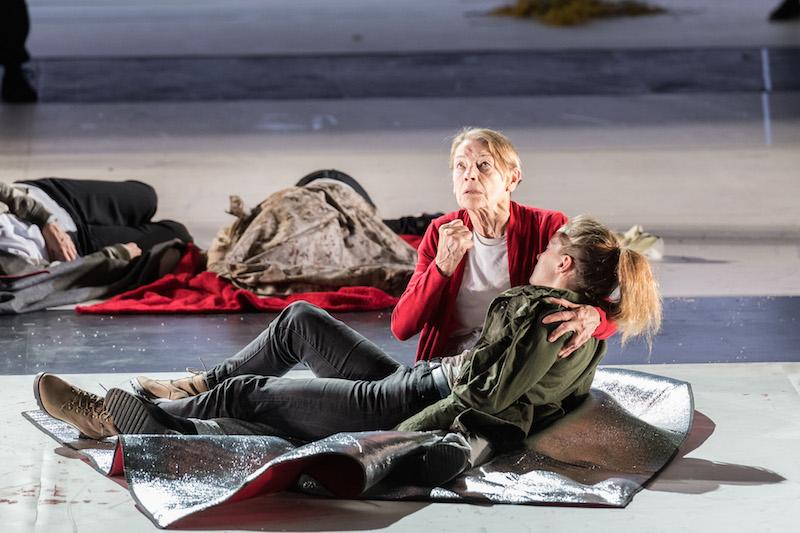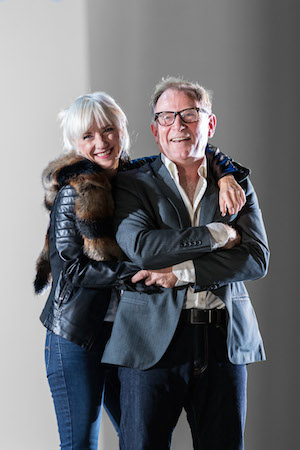King Lear, Old Vic | reviews, news & interviews
King Lear, Old Vic
King Lear, Old Vic
Glenda Jackson returns to the stage as an authoritative Lear, gender irrelevant

The signs were there early in Glenda Jackson's career that she would one day have what it takes to "ascend the Everest" (as the cliché has it) of Lear. So powerful was her performance as Ophelia in Peter Hall's production of Hamlet in 1965 that there was talk afterwards of her being cast as the prince himself. Two years later she was another disturbed woman playing Charlotte Corday unforgettably whipping Marat with her hair in The Marat/Sade.
She went on to others, including Vittoria in The White Devil in 1976 and Phedra in 1984 at the Old Vic where she now owns the stage as Lear. She didn't seem to bother with anything as trivial as prettiness when she was young, although she was glamorous enough in her Oscar-winning performances in Women in Love and A Touch of Class. Now, returning to the stage after a quarter of a century, her pale, lined face, skull-hugging hair and slight, androgynous frame are a positive advantage. And that voice rings out clearly still.
 Between times, from 1992 to 2015, as a Labour MP, Jackson gave the House of Commons the benefit of her toughness in speeches that invariably spoke for the dispossessed in society, notably the homeless. When as Lear she bellows "O reason not the need" with such heartfelt ferocity, she might once again be addressing Iain Duncan Smith across the chamber. King Lear was, in that sense, an obvious choice for her, but its physical demands and the stamina required argue tremendous courage for a woman of her years; she is, unusually for the actor playing Lear, exactly the age of the character: 80. Often dwarfed by those around her she is, nevertheless, "every inch a king" and, as Lear loses his grip on reality and in the scenes with the blinded Gloucester and the body of Cordelia she is very moving. Her daring has paid off.
Between times, from 1992 to 2015, as a Labour MP, Jackson gave the House of Commons the benefit of her toughness in speeches that invariably spoke for the dispossessed in society, notably the homeless. When as Lear she bellows "O reason not the need" with such heartfelt ferocity, she might once again be addressing Iain Duncan Smith across the chamber. King Lear was, in that sense, an obvious choice for her, but its physical demands and the stamina required argue tremendous courage for a woman of her years; she is, unusually for the actor playing Lear, exactly the age of the character: 80. Often dwarfed by those around her she is, nevertheless, "every inch a king" and, as Lear loses his grip on reality and in the scenes with the blinded Gloucester and the body of Cordelia she is very moving. Her daring has paid off.
But, important as the title role is, King Lear requires several other strong performances and Deborah Warner's Brechtian-style production doesn't deliver in all cases. On the positive side, Rhys Ifans's Fool (pictured above) is the best I've seen. Sadly, intelligently truth-telling, physically daring (including bravely swallowing a raw egg), mischievous – he adlibs and flirts with the audience – he is genuinely funny. Dressed in a mangled version of a Superman suit (and, for his prophecy, a scary clown mask), causing a deluge of beer cans to tumble from Goneril's fridge, he brings a splash of colour to proceedings in a mainly monochrome world. There is a genuine bond of understanding and affection between this Fool and his master.
Simon Manyonda as Edmund, Harry Melling as Edgar and Sargon Yelda as Kent all provide strong support, and Morfydd Clark is an independent-minded, clear-spoken Cordelia. As Goneril and Regan, however, Celia Imrie and Jane Horrocks (below, with Danny Webb as Cornwell) are rather too close to being the wicked sisters, sometimes to the point of caricature, and Karl Johnson, although touching as Gloucester, is not always easy to hear.
 The premise of the production is that we must acknowledge at all times that we are in a theatre, possibly even a rehearsal: each scene is labelled Act I, scene I etc, and cast members wander on stage – which is still being swept – before the action begins. Costumes are mostly modern casual gear, sometimes with a nod to character: Jane Horrocks as sex-mad Regan wears skinny jeans and spike heels, for instance. There are oddly risible moments, most surprisingly in the removal of Gloucester's second eye. Later Goneril dons Marigolds to mop up Regan's vomit. And some odd choices: why does Edmund deliver the "Bastard" speech while skipping?
The premise of the production is that we must acknowledge at all times that we are in a theatre, possibly even a rehearsal: each scene is labelled Act I, scene I etc, and cast members wander on stage – which is still being swept – before the action begins. Costumes are mostly modern casual gear, sometimes with a nod to character: Jane Horrocks as sex-mad Regan wears skinny jeans and spike heels, for instance. There are oddly risible moments, most surprisingly in the removal of Gloucester's second eye. Later Goneril dons Marigolds to mop up Regan's vomit. And some odd choices: why does Edmund deliver the "Bastard" speech while skipping?
The soundscape occasionally makes speech difficult to hear. The storm (for which Warner has said the actors are, of necessity, miked) is spectacular, however, with its effects of lashing rain, thunder and lightning. This is an occasion where the epic qualities of the stage with its design – by Warner herself and Jean Kalman – of monumental, moveable white flats suit the production well. At other times, the actors seem diminished and a more intimate space might have allowed better scope for detail and improved audibility.
10 GREAT KING LEARS
Greg Hicks, RSC. Hicks occupies the part with brisk and inventive intensity.
Derek Jacobi, Donmar Warehouse. A thrilling chamber version, though even at 72 Jacobi still seems too spry
Grigori Kozintsev, 1971 Russian film version. Truly apocalyptic masterpiece, stunningly performed
Tatsuya Nakadai, Kurosawa's Ran. Lear-inspired epic of the futility of war
Jonathan Pryce, Almeida Theatre. Pryce heads a disturbingly dysfunctional family in a compelling production of Shakespeare's tragedy
Simon Russell Beale, National Theatre. Russell Beale's Lear budges up to make room for Mendes's vision
Barrie Rutter, Northern Broadsides. Jonathan Miller's vivid production puts Lear in a Yorkshire accent
Antony Sher, RSC. Sher runs the full delivery gamut in Gregory Doran's distinguished production
John Shrapnel, Tobacco Factory. A traditional Lear triumphs in the heat of Bristol's alchemical vessel
Aleh Sidorchik, Shakespeare's Globe. Belarus Free Theatre stages Lear as post-Soviet Oedipal X-Factor extravaganza
rating
Explore topics
Share this article
Add comment
The future of Arts Journalism
You can stop theartsdesk.com closing!
We urgently need financing to survive. Our fundraising drive has thus far raised £49,000 but we need to reach £100,000 or we will be forced to close. Please contribute here: https://gofund.me/c3f6033d
And if you can forward this information to anyone who might assist, we’d be grateful.

Subscribe to theartsdesk.com
Thank you for continuing to read our work on theartsdesk.com. For unlimited access to every article in its entirety, including our archive of more than 15,000 pieces, we're asking for £5 per month or £40 per year. We feel it's a very good deal, and hope you do too.
To take a subscription now simply click here.
And if you're looking for that extra gift for a friend or family member, why not treat them to a theartsdesk.com gift subscription?
more Theatre
 Ragdoll, Jermyn Street Theatre review - compelling and emotionally truthful
Katherine Moar returns with a Patty Hearst-inspired follow up to her debut hit 'Farm Hall'
Ragdoll, Jermyn Street Theatre review - compelling and emotionally truthful
Katherine Moar returns with a Patty Hearst-inspired follow up to her debut hit 'Farm Hall'
 Troilus and Cressida, Globe Theatre review - a 'problem play' with added problems
Raucous and carnivalesque, but also ugly and incomprehensible
Troilus and Cressida, Globe Theatre review - a 'problem play' with added problems
Raucous and carnivalesque, but also ugly and incomprehensible
 Clarkston, Trafalgar Theatre review - two lads on a road to nowhere
Netflix star, Joe Locke, is the selling point of a production that needs one
Clarkston, Trafalgar Theatre review - two lads on a road to nowhere
Netflix star, Joe Locke, is the selling point of a production that needs one
 Ghost Stories, Peacock Theatre review - spirited staging but short on scares
Impressive spectacle saves an ageing show in an unsuitable venue
Ghost Stories, Peacock Theatre review - spirited staging but short on scares
Impressive spectacle saves an ageing show in an unsuitable venue
 Hamlet, National Theatre review - turning tragedy to comedy is no joke
Hiran Abeyeskera’s childlike prince falls flat in a mixed production
Hamlet, National Theatre review - turning tragedy to comedy is no joke
Hiran Abeyeskera’s childlike prince falls flat in a mixed production
 Rohtko, Barbican review - postmodern meditation on fake and authentic art is less than the sum of its parts
Łukasz Twarkowski's production dazzles without illuminating
Rohtko, Barbican review - postmodern meditation on fake and authentic art is less than the sum of its parts
Łukasz Twarkowski's production dazzles without illuminating
 Lee, Park Theatre review - Lee Krasner looks back on her life as an artist
Informative and interesting, the play's format limits its potential
Lee, Park Theatre review - Lee Krasner looks back on her life as an artist
Informative and interesting, the play's format limits its potential
 Measure for Measure, RSC, Stratford review - 'problem play' has no problem with relevance
Shakespeare, in this adaptation, is at his most perceptive
Measure for Measure, RSC, Stratford review - 'problem play' has no problem with relevance
Shakespeare, in this adaptation, is at his most perceptive
 The Importance of Being Earnest, Noël Coward Theatre review - dazzling and delightful queer fest
West End transfer of National Theatre hit stars Stephen Fry and Olly Alexander
The Importance of Being Earnest, Noël Coward Theatre review - dazzling and delightful queer fest
West End transfer of National Theatre hit stars Stephen Fry and Olly Alexander
 Get Down Tonight, Charing Cross Theatre review - glitz and hits from the 70s
If you love the songs of KC and the Sunshine Band, Please Do Go!
Get Down Tonight, Charing Cross Theatre review - glitz and hits from the 70s
If you love the songs of KC and the Sunshine Band, Please Do Go!
 Punch, Apollo Theatre review - powerful play about the strength of redemption
James Graham's play transfixes the audience at every stage
Punch, Apollo Theatre review - powerful play about the strength of redemption
James Graham's play transfixes the audience at every stage
 The Billionaire Inside Your Head, Hampstead Theatre review - a map of a man with OCD
Will Lord's promising debut burdens a fine cast with too much dialogue
The Billionaire Inside Your Head, Hampstead Theatre review - a map of a man with OCD
Will Lord's promising debut burdens a fine cast with too much dialogue

Comments
I saw a preview & thought